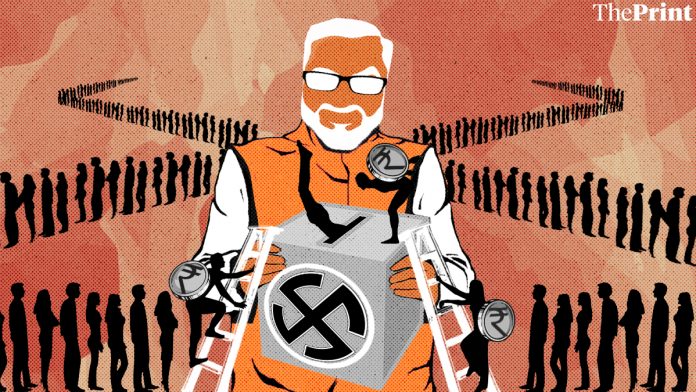 Illustration by Soham Sen
Illustration by Soham SenOne key headline-point from the Narendra Modi government’s latest Budget is the raising of top tax rates for the rich earning more than Rs 2 crore a year. The increase is steeper for the super-rich — above Rs 5 crore per year. The top tax rate now goes to 42.3 per cent.
It seems like such an awful example of the Indira Gandhi-style ‘soak-the-rich’ politics, people like us might say. Many others in deeply pink polity would hail it as uplifting evidence that Modi too has fully embraced the principles of socialism as mandated in the Constitution’s post-Emergency preamble. Never mind that he leads India’s most unabashed government of the Right into its second term.
Both are wrong. Because the Modi government isn’t really soaking the rich, but the middle classes, who also happen to be its most loyal vote bank. Question: Is their unquestioning loyalty the reason the government can afford to treat them like this?
Over the past five years, the Modi government has carried out probably the most spectacular and efficient transfer, or redistribution, of national wealth to the poor. It is tough to estimate it to the last decimal point, but between housing, toilets, cooking gas and Mudra loans, anything between Rs 9-11 lakh crore was distributed to the poor. That it was done with minimal leakage and with no discrimination of caste or religion has been acknowledged. It helped Modi win a bigger second majority. And where did this money come from?
Our immediate instinct would be to imagine it came from the rich. But not quite so. The government kept raising taxes on fuel as crude prices fell, and folding the bonanza into its pocket. Most of this came from the vehicle-owning middle classes.
You can conclude, therefore, that a spectacular transfer of wealth did indeed take place to the poor. But it came from the middle classes of all strata and not particularly the rich. It also bought enough votes from the grateful poor for Modi to sweep the election.
All exit poll data, from the big cities to the urbanising states, tells you that the middle classes too voted overwhelmingly for the BJP. The rapidly urbanising state of Haryana, the richest in India with very few extreme poor, is a good example. The BJP was marginal here until 2014. This time it collected 58 per cent of the vote.
This is the most important political takeaway from the way Modi has run his economy. He has taken from those in the middle to give to those at the bottom, and both are voting for him with equal enthusiasm. The middle classes have emerged as his most rock-solid vote bank. And they happily pay for it.
Now come to the latest budget. Once again, there is that mere pretence of taking from the rich. But should it bother the rich?
CBDT data shows that in the last financial year only 6,351 individuals returned incomes above Rs 5 crore, with an average income of Rs 13 crore. How much additional revenue will the new tax rate bring? Just about Rs 5,000 crore. Not much more than a year’s turnover of the Indian Premier League. The poor will be thrilled the rich are being socked. And the really rich will complain in whispers but keep buying anonymous electoral bonds and dropping them off in one letter box — you can guess which one. Because if they don’t, the taxman might call.
The poor are easily fooled, purely for their cheap thrills and entertainment, but the real joke is on the middle classes. Because, as in 2014-19, they’re the ones who will contribute the wealth to be transferred to the poor. To begin with, the finance minister gifted them additional taxes on petrol and diesel in the budget to ‘make up’, hold your breath, for the drop in crude prices.
This has followed a string of policies that can only be described as “soak the middle class” and not the rich. During the Modi years, Long Term Capital Gains tax (LTCG) on equities was introduced, dividend distribution tax (DDT) was increased, additional tax was levied on dividend income above Rs 10 lakh per year, surcharge on incomes between Rs 50 lakh and one crore was raised (unless you call them super-rich today), import duty on gold increased to 12.5 per cent from 10 per cent, and subsidies were reduced and taken away from the middle class, including on cooking gas. We’d welcome the removal of these non-merit subsidies. But remember who is paying.
That Modi and the BJP can continue to treat the rising and expanding middle class this way shows that they have gamed its mind perfectly. Its loyalty to them is fired not so much by economic impulse as by something more visceral: The resurgent, muscular Hindu definition of Indian nationalism that they have bought into. Add to this the dislike of the Muslim. Many of them may still find lynchings abhorrent, but they are quite happy to see Muslims completely out of the power structure: Cabinet, top government positions, and greatly reduced in Parliament.
My colleague and Political Editor D.K. Singh points out a remarkable set of figures on the number of times the BJP finance ministers have mentioned the middle class in their budget speeches. Generally, it’s averaged five. In Piyush Goyal’s interim budget speech, it suddenly shot up to 13 times. It was election eve, after all. In Nirmala Sitharaman’s now, it fell to three. Of course, she also completely forgot the promises Goyal had made to the middle class in his speech in February: Increase in standard deduction, TDS threshold, relaxation of tax slabs. Why should we bother when you will vote for us out of your love for us, while the poor vote with gratitude?
For decades, India’s Muslim minority was similarly gamed by our ‘secular’ parties. They knew Muslims will vote for them out of their fear of the RSS/BJP. That’s the reason they saw no need to do anything for the Muslims. Their vote came as ransom for protection. The BJP has now realised the majority middle class sees a similar fundamental compulsion to vote for it. That’s the reason we call them Modi’s ‘Muslims’.





